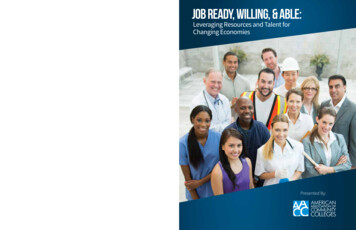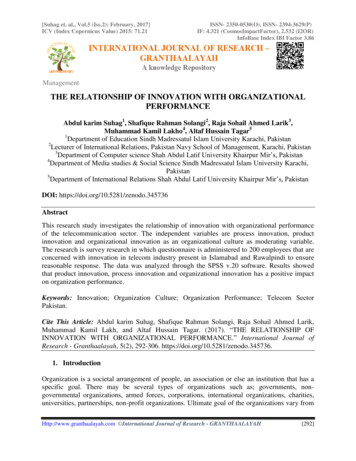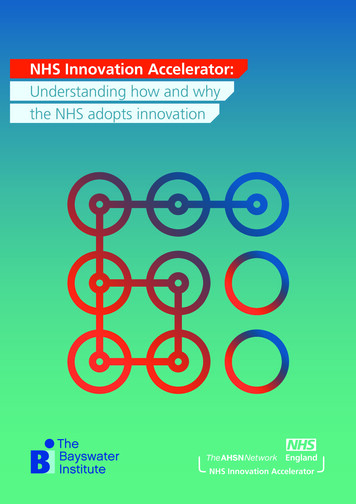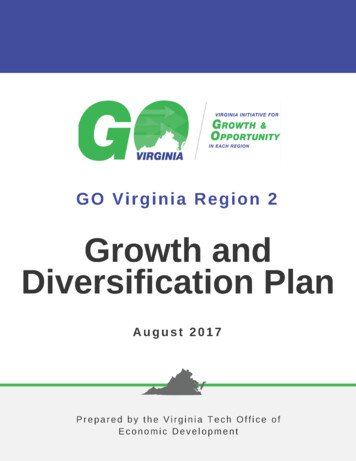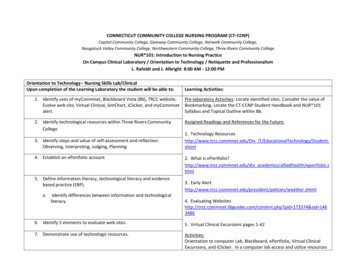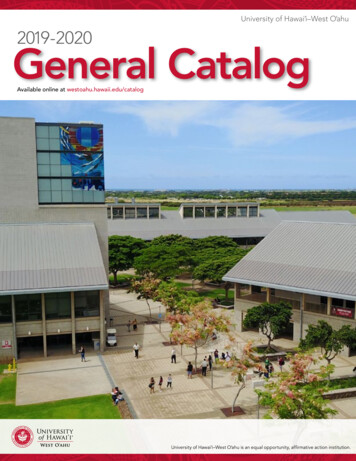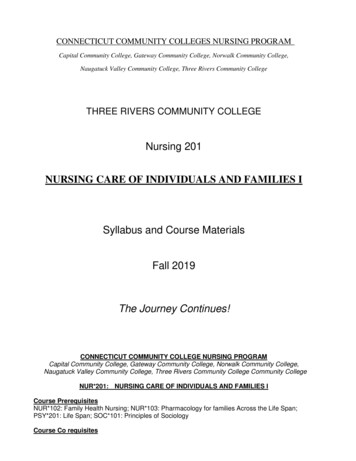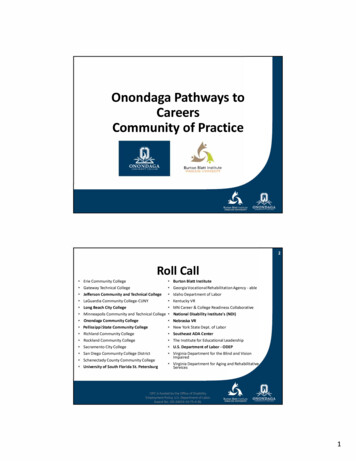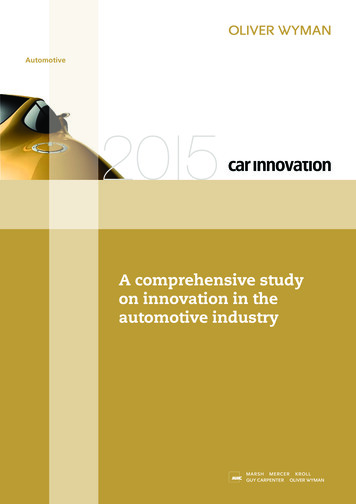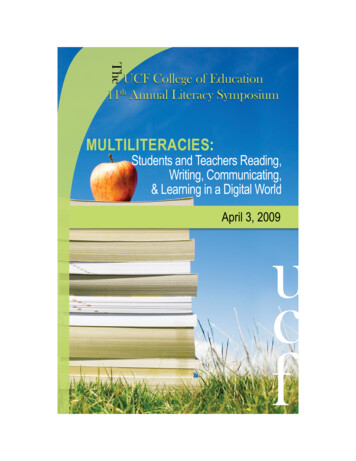
Transcription
MULTILITERACIES:Students and Teachers Reading,Writing, Communicating,& Learning in a Digital WorldApril 3, 2009
UCF COLLEGE OF EDUCATION“We value Teachers and teaching.”University of Central Florida
{11 TH ANNUAL LITERACY SYMPOSIUMThe purpose of this event is to provide a vehicle forpreservice and inservice educators in Central Florida to shareand learn about proven and promising literacy practices, andnetwork with other educators. Thank you for contributing tothis effort. We hope that you gain knowledge about"Multiliteracies: Students and Teachers Reading, Writing,Communicating, & Learning in a Digital World".WELCOMING LETTERThank you for participating in the UCF College of Education’s11th Annual Literacy Symposium. We enjoy having you hereat UCF and hope that you benefit from our efforts.The literacy symposium is co-sponsored by the UCF Collegeof Education, the UCF CED Teaching & Learning Academy,the Florida Literacy & Reading Excellence Center (FLaRE),the Florida Online Reading Professional Development (FORPD) project, and Brake Educational Media (our eventsponsor). All of us (faculty, administration, and staff) arededicated to excellence in our teaching, research, andprofessional service. We value teachers and teaching,literacy, and professional development. We continue to lookfor ways to better serve Florida’s preK-12 teachers andstudents.We look forward to providing you with invaluable tools for yourlearning environments.Please join us again next year on April 2, 2010!Vicky Zygouris-Coe, PhD.Associate Professor of Education/Symposium Chairvzygouri@mail.ucf.edu407-823-03861Friday, April 3, 2009
{UCF COLLEGE OF EDUCATIONDouglas Hartman,Ph.D.2FeaturedSpeakersDouglas K. Hartman is a Professor of Literacy &Technology in the College of Education at theMichigan State University, Senior Editor of theJournal of Literacy Research, Co-Director & Principal Investigator in the Literacy Achievement Research Center, and Research Fellow with the Center for Health Intervention & Prevention. His keyresearch and teaching focus is on new literaciesand adolescent literacy.University of Central Florida
11 TH ANNUAL LITERACY SYMPOSIUMFeaturedSpeakersJohanna Riddle, a National Board Certified FLteacher, an art teacher, an arts administrator, amedia specialist, and an author. Johanna Riddle isthe author of Engaging the Eye Generation: VisualLiteracy Strategies for the K-5 Classrooms (2009,Stenhouse Publishers).Johanna Riddle3Friday, April 3, 2009
IncentiveRandom HouseJosey-Bass Penguin PutnamScholastic Christopher-GordonIRABRAKEEducational Media, Inc.IsYour One Stop Shop forProfessional Teacher Resources forLifelong LearnersWe distribute the finest professional books at 10-20% offtheir list price and FREE SHIPPING STATEWIDEfromStenhouse Scholastic Corwin GuilfordChristopher-Gordon Kendall/Hunt Evan-MoorMarilyn Burns Math Solutions Josey-BassPenguinPutnamRandomHouseIncentive Publications ASCDHoughton Mifflin Little, Brown IRAMcGraw Hill Childrens’ Publishing Maupin HouseCreative Teaching Press Pearson EducationCarson-Dellosa Teacher Idea PressAnd more!We also represent Heinemann Professional Books,Teacher Created Materials, Developmental StudiesCenter, Flocabulary, Rourke and Okapi—call for moreinformation!1-800-329-3186Creative Teaching Press Pearson Education4Kendall/HuntMcGraw Hill Childrens’ PublishingEvan-MoorGuilfordHoughton Mifflin AOL Time WarnerCorwinStenhouse
{11 TH ANNUAL LITERACY SYMPOSIUM8:00-8:30AMRegistrationUCF College of Education Complex8:30-9:00AMWelcomeSESSION INFORMATIONAgendaUCF College of Education Complex9:00-10:15AMKeynote: Douglas HartmanPreparing a New Generation of Teachersand Students for the New Literacies of theInternetUCF College of Education ent SessionsUCF Teaching and Learning Academy rent SessionsUCF Teaching and Learning Academy Building12:15-1:00PMLunch on your own-Book signing by keynote speakers1:00-2:15PMKeynote: Johanna RiddleEngaging the Eye GenerationUCF College of Education Complex2:15-2:30PMTransition2:30-3:30PMConcurrent Sessions*UCF Teaching and Learning Academy Building*Participants will receive certificates of attendance during thisconcurrent session!5Friday, April 3, 2009
{UCF COLLEGE OF EDUCATIONSessionInformationConcurrent Session10:30AM-11:15AMSpecial Keynote Presentation:Room TA117Scaffolding the Literacy Leadership TeamAudience: AllThis presentation will bring to the forefront utilization ofthe literacy coach to support the professional learning ofa school’s literacy leadership team to sustain and expandsuccess. Throughout the presentation guidedconversations will assist participants in developing theirown action steps and plans for creating a knowledgeableliteracy leadership team supported by an effective andefficient literacy coach to promote forward shifts. Thefocus of the session is on the literacy leadership teaminvestigative cycle and the utilization of vertical andhorizontal assessments to define adaptive challenges.Enrique A. Puig taught for 25 years in Orange County Public Schools(OCPS) and has co-authored The Literacy Coach: Guiding in the RightDirection (Allyn & Bacon/ Pearson) and The Literacy LeadershipTeam: Sustaining and Expanding Success (Allyn & Bacon/ Pearson).Enrique has worked as an education consultant for numerous schooldistricts from Maryland to Washington and major publishingcompanies. Currently, he is a board member of the AmericanReading Forum and the director of the Florida Literacy and ReadingExcellence Center at the University of Central Florida.6University of Central Florida
{11 TH ANNUAL LITERACY SYMPOSIUMEnrique PuigDirector, FLaRE CenterRoom TA102Destination: Reading Comprehension in the 21stCenturyAudience: grades K-3Strategies that readers of all ages use routinely toconstruct meaning will be examined such as modelingthinking, inferring, asking questions, making connections,determining importance in text, creating mental imagesand synthesizing information in order to improve readingcomprehension skills. The six effective tools for successfulreading comprehension will be used to encourageparticipants to construct an ideal reading workshop in theirclassrooms that facilitates reading with meaning. Materialwill be presented in an interactive manner to stimulate andencourage collegial conversations. A power point slideshow will be used to present information and cooperativegrouping will also be incorporated to stimulate new ideasand strategies.SESSION INFORMATIONThis session is for teachers, literacy coaches, schooladministrators, and district administrators.Fanita McNealBentley Elementary SchoolRoom TA110Advancing Student Literacy with Newspaper-basedInstructionAudience: grades 6-8This interactive session will introduce educators to thestrategic benefits of using USA TODAY to advance students’literacy. Participants will use a number of innovative, activereading strategies with the newspaper that will engagestudents and improve reading comprehension andanalytical thinking skills. This newspaper-based readinginstruction promotes and facilitates the transfer ofcomprehension skills to content-area texts, supporting thesuccessful transition to high school for middle schoolstudents. All comprehension strategies are research basedand founded on the recommendations made by ReadingNext and the report by the National Reading Panel.Julie ParslowUSA Today7Friday, April 3, 2009
{UCF COLLEGE OF EDUCATIONRoom TA116Bringing Vocabulary Digital Stories into Content AreaLiteracyAudience: grades 6-8 & 9-12This presentation will describe three main genres ofvocabulary digital stories in content area classrooms:narrative, inquiry, and non-fiction. Presenters will shareexamples of each and give tips on ways to create engagingstories. They will also share ways to encourage students tocreate their own vocabulary digital stories.Susan WegmannUniversity of Central FloridaRoom TA202B Teaching Graphic Novels: Reading Strategies Alignedto the StandardsAudience: grades 6-8 & 9-12This session will focus on teaching multiliteracies withgraphic novels, and will do so by suggesting familiar,practical reading strategies that align with the standards.Participants will receive handouts and graphic novelrecommendations.Katie MonninUniversity of North FloridaRoom TA203Biology Bob: Save the World– A Musical JourneyAudience: AllDr. Robert Everett, “Biology Bob”, has been using hisoriginal concept specific songs, Bio-Notes, in the teachingof life science to children for over twenty years. He iscurrently an Associate Professor of Elementary Education inthe College of Education at the University of CentralFlorida. This musical presentation will focus on theenvironment and will highlight some of Biology Bob’snewer songs. Some of the songs presented will be: “Trees”,“Save the World”, and “The Wonders of Life”. Music is anatural for the multiliteracies. Communication from bothmelody and lyrics enhances motivation and learning foreveryone.Robert EverettUniversity of Central Florida8University of Central Florida
{11 TH ANNUAL LITERACY SYMPOSIUMVivacious VocabularyAudience: grades K-5Want your students to be ecstatic about Vocabulary? Wantto find time in your day to fit it in? Join us at VivaciousVocabulary.where Vocabulary is actually learned, notassigned!!! Learn all about a five day Vivacious routinethat will excite your students and you will be amazed athow your students will incorporate the new words intotheir oral language and writing. Participants will leavewith a great understanding of how to incorporate thispowerful, easy, fun routine into their day only using 10-15minutes a day.SESSION INFORMATIONRoom TA204Allison BrownJUALS Classroom LibrariesRoom TA221Yes, You Can Make Content Area TextComprehensible to ELLs!Audience: grades 6-8 & 9-12Teachers today are encouraged to employ a multitude oftexts and activities to immerse their students in theacademic language of the content areas. However, manyreport feeling unsure about how to modify lesson plans toassist their English language learners (ELLs) in developingboth concepts and language skills. The research-basedSHOW & TELL approach assists teachers in selectingeffective communication strategies geared toward thelevel of English proficiency of the ELLs while meeting theneeds of native speakers. After an experiential activity andhearing a brief overview of the approach framework, theaudience will collaboratively put it into action.Joyce Nutta & Carine Strebel HalpernUniversity of Central Florida9Friday, April 3, 2009
{UCF COLLEGE OF EDUCATIONRoom TA222Red Light! Green Light! STOP! Classroom Disruptionsand Regaining Teaching Time to Improve LiteracyAudience: grades K-5Using gimmicks to promote positive behavior? Moving achild's clothespin from green to yellow to red on a trafficlight says: it's ok to misbehave a few times! Showing students genuine care and concern is the cornerstone of building their trust. Learn how to establish rapport with students, how to diffuse low level behavior, and how to explicitly teach students routines and expectations. Get them tobehave THE FIRST TIME you ask them to! Address off-taskbehavior immediately and regain precious teaching time inall subjects. Let a National Board Certified Teacher/Assistant Principal entertain you and show you how!Adam PalmeseEngelwood Elementary SchoolRoom TA302Research, Thematic Units and Adolescent Literature:A Pilot Reading Program for All StudentsAudience: grades 6-8 &9-12Teachers create thematic units using adolescent literatureand 70% informational text, then teach students to createtheir own units to gradually release responsibility for student learning. The articles are used for direct instruction inlarge and small group and guided reading. By using thisapproach, the student is motivated and responsible for hisor her own learning. This pilot program for reading is usedin a Sarasota High School in conjunction with Fusion, thescheduling of English and Intensive Reading with the sameteacher, but is recommended for English classes as well.The presentation uses a PowerPoint/speaker format.Barbara O’BrienNorth Port High School10University of Central Florida
{11 TH ANNUAL LITERACY SYMPOSIUMPicture Books at the Secondary Level: A Content AreaTool for Teaching and LearningAudience: grades 6-8 & 9-12The content will include the multiple purposes of usingcrossover picture books, and other types of text to engagereaders, build background knowledge, extend vocabularyand concept knowledge, support anchor lessons for strategic thinking activities, connect to content information andtextbooks, develop understanding of genres, teach literacydevices for writing, and provide rich support for EnglishLanguage Learners. Discussion techniques and interactiveread-alouds will be shared to demonstrate how social interaction can increase understanding and enhance thelearning experience while meeting the needs of diverselearners. Participants will interact with exemplary crossover picture books that have multiply layers of meaningrevealed through illustration and text. A specific unit willbe shared, relating reading, writing, communicating, andlearning in a digital world.SESSION INFORMATIONRoom TA304Elizabeth McClure & Constance CainUniversity of Central FloridaRoom TA322Building BridgesAudience: grades 6-8 & 9-12There is rarely a single reason a struggling reader struggles, however, in our busy classrooms we do not have timeto focus on the causes. This session will help you develop atoolbox of strategies to help motivate those struggling toread in the content areas in ways that are sure to engageyour own creativity and love of teaching.Twila Haeser, Christine Ebey, & Thea MannWildwood High School11Friday, April 3, 2009
{UCF COLLEGE OF EDUCATIONRoom TA320TeachME (teaching in a mixed reality environment)Audience: All* This session has limited seating (approximately 20 people)During this session teachers will have a chance to teachstudents in UCF's state-of-the-art virtual classroom. Thestudent avatars stand ready to test your skills as a teacherand to allow you try new strategies without putting asingle child at risk. Stop by and see this new andinnovative approach to teacher preparation and try yourskills with the class.Lisa Dieker & Michael HynesUniversity of Central FloridaRoom ED190Poetry and Narrative: Understanding the HumanExperience Through the SensesAudience: grades 6-8 & 9-12This session will focus on reflecting on sensoryinformation, presented in poetry/narrative, as part of a“during read”/“post-read” process – to enhanceunderstanding of the human experience (comprehension)through an enriched visualization strategy.Joan Cannon-DicksMiddleburg High School12University of Central Florida
{11 TH ANNUAL LITERACY SYMPOSIUM11:30am-12:15pmRoom TA102Google Earth, Primary Sources, and LiteracyConnectionsAudience: AllThe ability to link Internet-accessible resources withinGoogleEarth (using the placemark feature) makes it anexcellent vehicle for pulling primary source informationinto the classroom to support literacy connections. Thissession will showcase examples of two specificinstructional practices. One focuses on creating backdropsto classroom readings based upon the setting and theother on making connections between subject-specificvocabulary and physical locations. The session willconclude with a demonstration of how easy it is to createthe backdrop and participants will be provided with stepby-step documentation.SESSION INFORMATIONConcurrent SessionLarry BedenbaughUniversity of Central FloridaRoom TA110Advancing Student Literacy with Newspaper-basedInstructionAudience: grades 9-12This interactive session will introduce educators to thestrategic benefits of using USA TODAY to advance students’literacy. Participants will use a number of innovative, activereading strategies with the newspaper that will engagestudents and improve reading comprehension andanalytical thinking skills. This newspaper-based readinginstruction promotes and facilitates the transfer ofcomprehension skills to content-area texts, supporting thesuccessful transition to post-secondary courses for highschool students. All comprehension strategies are researchbased and founded on the recommendations made byReading Next and the report by the National Reading Panel.Julie ParslowUSA Today13Friday, April 3, 2009
{UCF COLLEGE OF EDUCATIONRoom TA116Teaching Graphic Novels: Reading Strategies Alignedto the StandardsAudience: grades 6-8 & 9-12This session will focus on teaching multiliteracies withgraphic novels, and will do so by suggesting familiar,practical reading strategies that align with the standards.Participants will receive handouts and graphic novelrecommendations.Katie MonninUniversity of North FloridaRoom TA117The Magic of Riddles: Fun With Language Across theCurriculumAudience: grades K-5This presentation will demonstrate how riddles can be usedfor developing higher level thinking skills, enhancinglanguage and literacy proficiency, and promoting skills inspecific content areas. Riddles bring a hearty laugh tochildren while heightening opportunities to facilitatelanguage learning across the curriculum. By supporting anatural curiosity with words, providing challengingexperiences, and motivating through the power of humor,riddles make learning and using language fun! Thispresentation will include a PowerPoint presentation andculminate with a hands-on activity in which participants willmake a pop-up riddle book.Rita BuchoffUniversity of Central Florida14University of Central Florida
{11 TH ANNUAL LITERACY SYMPOSIUMLearningAudience: grades 1-5Strategic reading logs (SRLs) focus on strategies fortracking thinking and vocabulary development. SRLs’focus is on teacher modeling of comprehensionstrategies, student oral and written description ofstrategies, and student application during reading ofauthentic text. Sample strategies include predictionreflection, text connections, click/clunk, text coding, andgraphic organizers for summarizing/retelling. Throughlecture and demonstration, presenters will show SRLsamples (1st through 5th grades), share results of preand post- interview data, and describe digitalapplications.SESSION INFORMATIONRoom TA202B Strategic Reading Logs: Tools for Thinking andKarri Williams, Beth Warren, & Cindy VanderpoolUniversity of Central Florida, West Melbourne School forScience, & Ralph Williams Elementary SchoolRoom TA203Using Skype to Engage LearnersAudience: grades 6-8 & 9-12The multilevel mentoring experience presented, resultedin engaging, authentic reading and writing activities withan emphasis on fluency and comprehension. Skype can beapplied in any classroom, for multiple purposes, whetherthe concern is content instruction or readingdevelopment. Presentation of Skype uses in middleschool, high school and the real world through an actualdemonstration, videos, photos, and PowerPoint.Lin Carver & Lauren PantojaGulf Middle School/Walden University15Friday, April 3, 2009
{UCF COLLEGE OF EDUCATIONRoom TA204Reading in Math: Technology 101Audience: grades 6-8Challenged learners can improve their learning and readingskills using simple software and tools available to almosteveryone. Struggling readers learn reading strategiesduring (math) classes using basic software such asAudacity and tools such as a headphone (withmicrophone). Struggling readers can isolate key phrasesand terms associated with difficult math word problems,resulting in improved math and reading scores.Glen Stroman, William (Bill) Murdock, & John BouchardFort Caroline Middle SchoolRoom TA221Engaging the Struggling Middle School ReaderAudience: grades 6-8This session presents ideas for engaging and reaching thestruggling adolescent reader. The typical middle schoolreading curriculum for Level 1 and Level 2 reading studentfails to excite middle school students about reading. Thetypical intensive reading class is seen as a punishment andthe student dreads the experience. In this session, we willpresent tried and proven strategies we all use in ourclassroom. Topics covered will include: useful SilentSustained Reading with a purpose, teaching reading usingthe content areas, purposeful progress monitoring, funfluency and prosody exercises, and strategies to integratevocabulary instruction into day to day classroom activities.Mindy Hodge, Natalie Heitman, & Lindsay WoodGray Middle SchoolRoom TA222The Language Demands of Secondary Schooling:Implications for Content Area Reading InstructionAudience: grades 6-8 & 9-12This presentation illuminates the linguistic challengesinvolved in reading texts in secondary content areas anddescribes a new approach to secondary reading instructionthat goes beyond the current emphasis on basic skills andgeneralizable strategies.Zhihui FangUniversity of Florida16University of Central Florida
{11 TH ANNUAL LITERACY SYMPOSIUMLiteracy Leadership Teams– Taking Part in ReachingAYPAudience: AllThis session is designed to assist Literacy LeadershipTeams in helping their school meet the criteria of AYP.(Adequate Yearly Progress) You will be exposed to howAYP is calculated and how it differs from the state grade;how Literacy Leadership Teams can use AYP data toimpact student performance; and ideas about howindividuals can use this information at their schools. Thepresentation will include interactive discussion, hands -onexperience working with school level data andinformation on how to plan to use the information withthe school level Literacy Leadership Team.SESSION INFORMATIONRoom TA302Bernadette Jaster & Stephanie DeLuciaEagle’s Nest Elementary & Pineloch ElementaryRoom TA304Tools for Building and Activating BackgroundKnowledgeAudience: grades 6-8The reading research on increased reading comprehensionis practically limitless in the area of "activating backgroundknowledge". As teachers "frontload" with experiences,vocabulary, visual connections students are able to movefrom memorizing information to meaningful learning. Myobjective is to provide some Web 2.0 tools (and more) toimplement within the classroom to build and activatebackground knowledge. My content is based on a yearlong Teacher Inquiry project I conducted through my 6thgrade department. I will present using Photo Story 3, Web2.0 tools and books and resources that are available.Gayle WeaverBradford Middle SchoolRoom TA320Reaching Digital Natives with E-LitAudience: grades 9-12This presentation will provide an overview of electronicliterature and situate it within the technologicalrevolution. I will then introduce examples of electronicliterature discussed in N. Katherine Hayles’ book17Friday, April 3, 2009
{UCF COLLEGE OF EDUCATION“Electronic Literature” and discuss some of the ways textschange as new technologies are introduced. What teachingopportunities does e-lit provide?Stacey DiLibertoUniversity of Central FloridaRoom TA320TeachME (teaching in a mixed reality environment)Audience: All* This session has limited seating (approximately 20 people)During this session teachers will have a chance to teachstudents in UCF's state-of-the-art virtual classroom. Thestudent avatars stand ready to test your skills as a teacherand to allow you try new strategies without putting a singlechild at risk. Stop by and see this new and innovativeapproach to teacher preparation and try your skills with theclass.Lisa Dieker & Michael HynesUniversity of Central Florida18University of Central Florida
{11 TH ANNUAL LITERACY SYMPOSIUM2:30pm-3:30pmRoom TA102Making the Connection: PowerPoint Applicationsthat Promote Student SuccessSESSION INFORMATIONConcurrent SessionAudience: grades K-5This session will explore ways to foster the enrichment ofstudents’ literacy learning through the integration ofMicrosoft PowerPoint applications. Strategies andactivities shared, including digital storytelling, can bereadily modified for classroom use through preparedtemplates that will be provided. Presenters willdemonstrate the incorporation of activities in all contentareas, with primary and intermediate examples. Don’tmiss this opportunity to explore many ways that yourstudents can become actively engaged in innovative waysthrough the use of technology!Taylar Clements, Vicky Lammers, & Analexis KennedyUniversity of Central Florida, Seminole County, & PalmBeach CountyRoom TA110Young Adult Literature: What’s New? What’sDifferent? What Teachers Should Know!Audience: grades 6-8 & 9-12Popularized by media and technology, young peoplegravitate to engaging fiction and non-fiction books. Thissession will share the latest young adult books and howteachers can incorporate them in their classrooms.Participants will share their knowledge and use of youngadult books, and engage in sample activities. Participantswill receive a PowerPoint, handouts, and emaildistribution of material about young adult books.Jeffrey KaplanUniversity of Central Florida19Friday, April 3, 2009
{UCF COLLEGE OF EDUCATIONRoom TA116The Power of PowerPoint: Using Multimedia as aMotivational Writing Tool in the K-6 ClassroomAudience: grades K-6Content addressed in the presentation includes subjectmatter knowledge of the writing process, features ofMicrosoft PowerPoint, and pedagogical practices. Thewriting process (pre-writing, rough draft, proofreading,editing, publishing) and implementation of MicrosoftPowerPoint features in a K-12 to support the process will beaddressed. The integration of technology, combined with aconstructivist, student-produced instructional approach willbe defined.Jessica LeveneUniversity of Central FloridaRoom TA117Red Light! Green Light! STOP! Classroom Disruptionsand Regaining Teaching Time to Improve LiteracyAudience: grades K-5Using gimmicks to promote positive behavior? Moving achild's clothespin from green to yellow to red on a trafficlight says: it's ok to misbehave a few times! Showingstudents genuine care and concern is the cornerstone ofbuilding their trust. Learn how to establish rapport withstudents, how to diffuse low level behavior, and how toexplicitly teach students routines and expectations. Getthem to behave THE FIRST TIME you ask them to! Addressoff-task behavior immediately and regain preciousteaching time in all subjects.Adam PalmeseEngelwood Elementary SchoolRoom 202BThe Short-Hand of the Modern Reader and Main IdeaAudience: grades 6-8 & 9-12This session emphasizes how to teach Main Idea usingterms familiar to the modern reader for the purpose ofimproving student understanding of Main Idea through thecreation of Main Idea Statements. Instruction also includeshow to use Main Idea Statements as marginal notes toimprove student focus, comprehension, and responseaccuracy.Joan Cannon-DicksMiddleburg High School20University of Central Florida
{11 TH ANNUAL LITERACY SYMPOSIUMPicture Books at the Secondary Level: A ContentArea Tool for Teaching and LearningAudience: grades 6-8 & 9-12The content will include the multiple purposes of usingcrossover picture books, and other types of text to engage readers, build background knowledge, extend vocabulary and concept knowledge, support anchor lessonsfor strategic thinking activities, connect to content information and textbooks, develop understanding of genres,teach literacy devices for writing, and provide rich support for English Language Learners. Discussion techniques and interactive read-alouds will be shared to demonstrate how social interaction can increase understanding and enhance the learning experience while meetingthe needs of diverse learners. Participants will interactwith exemplary crossover picture books that have multiply layers of meaning revealed through illustration andtext. A specific unit will be shared, relating reading, writing, communicating, and learning in a digital world.SESSION INFORMATIONRoom TA203Elizabeth McClure & Constance CainUniversity of Central FloridaRoom TA204Digital Booktalk: Bridging the Gap Between Intrinsicand Extrinsic Motivation to ReadAudience: grades 6-8 & 9-12We describe a research-based intervention that we havefound to provide opportunities to transform reluctantlearners into motivated readers and writers. Digital Booktalk (http://www.digitalbooktalk.com) is an online portalthat houses book trailers that match potential readerswith books. Our supplementary curriculum teaches students to create their own trailers, which is effective inmotivating students to read for context so they can accurately re-enact the main context of the book in their own2-minute videos. The objective of this presentation is todemonstrate through example how participants can begin to produce their trailers. The session includes demonstration, discussions, and Q&A.Glenda Gunter & Robert KennyUniversity of Central Florida21Friday, April 3, 2009
{UCF COLLEGE OF EDUCATIONRoom TA221Virtual Learning Environments: Multiliteracies in theReading ClassroomAudience: grades 6-8 & 9-12This presentation is designed to show participants howthey can enhance their literacy instruction with theaddition of a multiliteracies based virtual learningenvironment. Participants will learn how discussionpostings, real-time debates, group wiki pages, conceptglossaries, and word walls can be used as an extension ofclassroom instruction and an additional facet for learning.Through the use of their laptops, teachers will modelsuccessful virtual learning environments currently in placein their classrooms and share student artifacts.Information will also be shared on how to implement avirtual learning environment school-wide.Beth Davis, Jonathan Meyers, & Scott MartyHorizon Middle SchoolRoom TA222Teach with VisionAudience: grades 6-8 & 9-12Participants will interactively explore of multiliteracies in a21st century digital classroom. What does a "Teach withVision" classroom look like? This presentation willdemonstrate 21st century skills, instruction focused
Lifelong Learners We distribute the finest professional books at 10-20% off . UCF Teaching and Learning Academy Building 12:15-1:00PM Lunch on your own-Book signing by keynote speakers 1:00-2:15PM Keynote: . in a Sarasota High School in conjunction with Fusion, the
